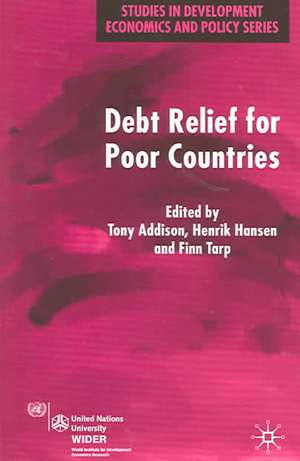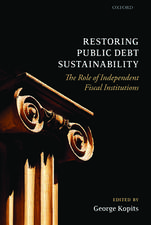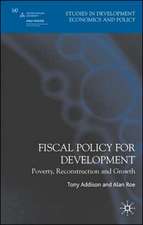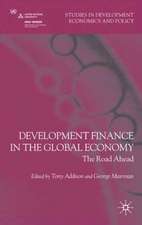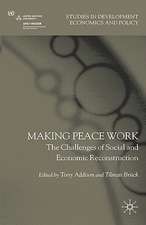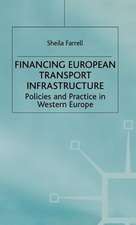Debt Relief for Poor Countries: Studies in Development Economics and Policy
Editat de T. Addison, H. Hansen, F. Tarpen Limba Engleză Paperback – 11 iun 2004
| Toate formatele și edițiile | Preț | Express |
|---|---|---|
| Paperback (1) | 640.88 lei 6-8 săpt. | |
| Palgrave Macmillan UK – 11 iun 2004 | 640.88 lei 6-8 săpt. | |
| Hardback (1) | 644.30 lei 6-8 săpt. | |
| Palgrave Macmillan UK – 11 iun 2004 | 644.30 lei 6-8 săpt. |
Din seria Studies in Development Economics and Policy
-
 Preț: 306.77 lei
Preț: 306.77 lei - 18%
 Preț: 688.91 lei
Preț: 688.91 lei - 15%
 Preț: 641.38 lei
Preț: 641.38 lei -
 Preț: 385.62 lei
Preț: 385.62 lei - 15%
 Preț: 641.20 lei
Preț: 641.20 lei - 15%
 Preț: 641.20 lei
Preț: 641.20 lei - 15%
 Preț: 645.60 lei
Preț: 645.60 lei - 15%
 Preț: 637.78 lei
Preț: 637.78 lei - 15%
 Preț: 651.99 lei
Preț: 651.99 lei - 15%
 Preț: 646.75 lei
Preț: 646.75 lei - 15%
 Preț: 643.34 lei
Preț: 643.34 lei - 15%
 Preț: 644.63 lei
Preț: 644.63 lei - 15%
 Preț: 645.28 lei
Preț: 645.28 lei - 15%
 Preț: 638.57 lei
Preț: 638.57 lei - 15%
 Preț: 644.95 lei
Preț: 644.95 lei - 15%
 Preț: 644.95 lei
Preț: 644.95 lei - 15%
 Preț: 653.14 lei
Preț: 653.14 lei -
 Preț: 391.61 lei
Preț: 391.61 lei - 15%
 Preț: 643.16 lei
Preț: 643.16 lei - 15%
 Preț: 644.18 lei
Preț: 644.18 lei - 15%
 Preț: 641.71 lei
Preț: 641.71 lei - 15%
 Preț: 646.75 lei
Preț: 646.75 lei - 18%
 Preț: 972.93 lei
Preț: 972.93 lei - 15%
 Preț: 644.49 lei
Preț: 644.49 lei - 15%
 Preț: 639.90 lei
Preț: 639.90 lei - 15%
 Preț: 643.34 lei
Preț: 643.34 lei - 18%
 Preț: 938.81 lei
Preț: 938.81 lei - 15%
 Preț: 641.53 lei
Preț: 641.53 lei - 18%
 Preț: 727.97 lei
Preț: 727.97 lei - 15%
 Preț: 642.03 lei
Preț: 642.03 lei
Preț: 640.88 lei
Preț vechi: 753.97 lei
-15% Nou
Puncte Express: 961
Preț estimativ în valută:
122.69€ • 128.01$ • 102.85£
122.69€ • 128.01$ • 102.85£
Carte tipărită la comandă
Livrare economică 12-26 martie
Preluare comenzi: 021 569.72.76
Specificații
ISBN-13: 9781403934956
ISBN-10: 1403934959
Pagini: 288
Ilustrații: IV, 324 p.
Dimensiuni: 140 x 216 x 18 mm
Greutate: 0.43 kg
Ediția:2004
Editura: Palgrave Macmillan UK
Colecția Palgrave Macmillan
Seria Studies in Development Economics and Policy
Locul publicării:London, United Kingdom
ISBN-10: 1403934959
Pagini: 288
Ilustrații: IV, 324 p.
Dimensiuni: 140 x 216 x 18 mm
Greutate: 0.43 kg
Ediția:2004
Editura: Palgrave Macmillan UK
Colecția Palgrave Macmillan
Seria Studies in Development Economics and Policy
Locul publicării:London, United Kingdom
Cuprins
PART I: EVALUATING DEBT RELIEF Introduction; T.Addison, H.Hansen & F.Tarp Debt Dynamics and Contingency Financing: Theoretical Reappraisal of the HIPC Initiative; M.Nissanke & B.Ferrarini Policy Selectivity Forgone: Debt and Donor Behaviour in Africa; N.Birdsall, S.Claessens & I.Diwan HIPC Debt Relief and Policy Reform Incentives; J-C.Berthélemy Resolving the HIPC Problem: Is Good Policy Enough? T.Addison & A.Rahman PART II: GROWTH EFFECTS OF DEBT RELIEF External Debt and Growth: Implications for HIPC Countries; C.Pattillo, H.Poirson & L.A.Ricci The Impact of External Aid and External Debt on Growth and Investment; H.Hansen External Debt, Growth and the HIPC Initiative: Is the Country Choice Too Narrow?; A.R.Chowdhury Debt Relief and Growth: A Study of Zambia and Tanzania; A.Bigsten, J.Levin & H.Persson PART III: POVERTY EFFECTS OF DEBT RELIEF Public Spending and Poverty in Mozambique; R.Heltberg, K.Simler & F.Tarp Debt Relief, Demand for Education, and Poverty; E.Dabla-Norris, J.M.Matovu & P.Wade Making Debt Relief Conditionality Pro-Poor; O.Morrissey
Recenzii
'It seems that with each new book it issues, UNU-WIDER further establishes its reputation as the intellectual leader among international organisations. This volume on debt is particularly outstanding. The chapters by the editors and their co-authors are quite impressive. The book should be read both by the novice and specialist.' - John Weeks, Professor of Development Economics, SOAS, University of London, UK
'The international financial institutions agreed to debt relief for the poorest countries, under pressure from the countries themselves and a vigorous NGO campaign. This extremely useful book provides in-depth analysis of the results of the debt relief contained in HIPC: they are positive, but small. Unfortunately, as the book demonstrates, HIPC debt relief will not provide the solution to the development problems of most poor countries.' - Frances Stewart, Director, Queen Elizabeth House, University of Oxford, UK
'Can debt relief be a powerful tool for advancing human rights, helping to save literally millions of lives, and for laying the foundations for economic growth, as its proponents often claim? In this pioneering volume, a group of economists challenge some of these unquestioned assumptions. Using empirical evidence, they concluded that: it is difficult to measure accurately the effect of debt relief on economic growth and poverty reduction; that the degree to which debt relief can contribute to poverty reduction largely depends on the existence of hospitable domestic and international policy environment; and that the quality of national institutions determine the effectiveness of debt relief on the ground. These are important and timely contributions that will deepen the debate on debt relief and poverty reduction.' - Fantu Cheru, Professor, School of International Service, American University, USA
'...the papers collected in this volume represent a very welcome addition to the literature.' - Andrew Mold - Journal of International Development
'The international financial institutions agreed to debt relief for the poorest countries, under pressure from the countries themselves and a vigorous NGO campaign. This extremely useful book provides in-depth analysis of the results of the debt relief contained in HIPC: they are positive, but small. Unfortunately, as the book demonstrates, HIPC debt relief will not provide the solution to the development problems of most poor countries.' - Frances Stewart, Director, Queen Elizabeth House, University of Oxford, UK
'Can debt relief be a powerful tool for advancing human rights, helping to save literally millions of lives, and for laying the foundations for economic growth, as its proponents often claim? In this pioneering volume, a group of economists challenge some of these unquestioned assumptions. Using empirical evidence, they concluded that: it is difficult to measure accurately the effect of debt relief on economic growth and poverty reduction; that the degree to which debt relief can contribute to poverty reduction largely depends on the existence of hospitable domestic and international policy environment; and that the quality of national institutions determine the effectiveness of debt relief on the ground. These are important and timely contributions that will deepen the debate on debt relief and poverty reduction.' - Fantu Cheru, Professor, School of International Service, American University, USA
'...the papers collected in this volume represent a very welcome addition to the literature.' - Andrew Mold - Journal of International Development
Notă biografică
JEAN-CLAUDE BERTHÉLEMY Professor of Economics, University of Paris 1 Pantheon Sorbonne, FranceARNE BIGSTEN Professor of Development Economics, Göteborg University, SwedenNANCY BIRDSALL Founding President, Center for Global Development, Washington, USAABDUR R. CHOWDHURY Director, Economic Analysis Division, United Nations Commission for Europe, Geneva, SwitzerlandSTIJN CLAESSENS Professor of International Finance, University of Amsterdam, The NetherlandsERA DABLA-NORRIS International Monetary Fund, USAISHAC DIWAN Company Director for Ethiopia and Sudan, World Bank, USABENNO FERRARINI Director of Economic Research at the World Trade Institute, Switzerland RASMUS HELTBERG World Bank, USAJÖRGEN LEVIN Research Fellow, Örebo University, SwedenJOHN M. MATOVU International Monetary Fund, USAOLIVER MORRISSEY Director, Centre for Research in Economic Development and International Trade, University of Nottingham, UKMACHIKO NISSANKE Head of Economic Department, School of Oriental and African Studies, University of London, UKCATHERINE PATTILLO Senior Economist, International Monetary Fund, USAHÅKAN PERSSON Associate Professor of Economics, Örebo University, SwedenHÉLÈNE POIRSON Economist, International Monetary Fund, USAAMINUR RAHMAN PhD candidate in economics, University College, London, UKLUCA ANTONIO RICCI International Monetary Fund, USAKENNTH SIMLER Research Fellow, International Food Policy Institute, Washington, USAPAUL WADE World Bank,USA
